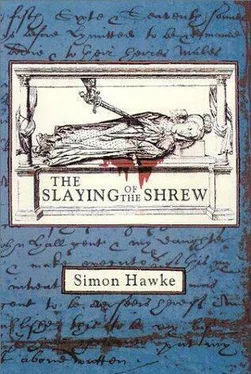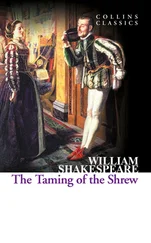Simon Hawke - The Slaying Of The Shrew
Здесь есть возможность читать онлайн «Simon Hawke - The Slaying Of The Shrew» весь текст электронной книги совершенно бесплатно (целиком полную версию без сокращений). В некоторых случаях можно слушать аудио, скачать через торрент в формате fb2 и присутствует краткое содержание. Жанр: Исторический детектив, на английском языке. Описание произведения, (предисловие) а так же отзывы посетителей доступны на портале библиотеки ЛибКат.
- Название:The Slaying Of The Shrew
- Автор:
- Жанр:
- Год:неизвестен
- ISBN:нет данных
- Рейтинг книги:5 / 5. Голосов: 1
-
Избранное:Добавить в избранное
- Отзывы:
-
Ваша оценка:
- 100
- 1
- 2
- 3
- 4
- 5
The Slaying Of The Shrew: краткое содержание, описание и аннотация
Предлагаем к чтению аннотацию, описание, краткое содержание или предисловие (зависит от того, что написал сам автор книги «The Slaying Of The Shrew»). Если вы не нашли необходимую информацию о книге — напишите в комментариях, мы постараемся отыскать её.
The Slaying Of The Shrew — читать онлайн бесплатно полную книгу (весь текст) целиком
Ниже представлен текст книги, разбитый по страницам. Система сохранения места последней прочитанной страницы, позволяет с удобством читать онлайн бесплатно книгу «The Slaying Of The Shrew», без необходимости каждый раз заново искать на чём Вы остановились. Поставьте закладку, и сможете в любой момент перейти на страницу, на которой закончили чтение.
Интервал:
Закладка:
“I do see what you mean,” Smythe said. “The last thing the father of the bride would need on the night before the wedding was a hue and cry raised about an overheard conversation in a garden. Still, it has a most intimate bearing on his family, and were it my own daughter who was being so intrigued against, I would most certainly wish to know!”
“Indeed,” Shakespeare agreed. “However, let us first examine what you do know.”
Smythe frowned once more. “But… what do you mean? Did I not just tell you?”
“You told me that you had overheard a conversation,” Shakespeare replied, “but between whom?”
“Why, the two men in the maze!”
“What were their names? What did they look like?”
“Why, how in the world should I know? I do not think that either of them used the other’s name. And as for what they looked like, I never even caught a glimpse of them!”
“Precisely,” Shakespeare said, with a wry grimace. “You have overheard a conversation which may lead you, justifiably, to make an accusation, but against whom?” He shrugged. “There are many visitors here. This is the largest wedding the society of London has seen since… well, certainly since we have been in London. And what have you to go by to identify these men save for the sounds of their voices? For that matter, unless a voice should have some marked characteristic that renders it uncommon, one voice often sounds much like another. Can you be certain, beyond any shadow of a doubt, that you could pick these two voices out from all the rest? Or from one that may sound similar?”
“ ‘Sdeath! You have me there. I should think that I would know them if I heard them once again, but to say they are the ones beyond any shadow of a doubt… but wait… there is one thing! I know that they plan to pose as a nobleman and his son! That should enable us to identify them!”
“Indeed?” said Shakespeare. “And how many noblemen do you suppose will be in attendance at this wedding, hmm? Considering, of course, that this celebration is to be the single most significant social event of the season. And how many of them, do you suppose, shall bring their sons along, as well, especially considering that the extremely, one might even say obscenely wealthy Master Middleton still has an emminently marriageable and, by all accounts, extremely beautiful younger daughter?”
“Ah,” said Smythe, weakly.
“Ah, indeed.”
“So then… what are we to do?”
“Well, ‘twould seem to me that you have a number of things to consider before we can answer that question,” Shakespeare replied. “For one thing, you seem to have neglected, at least for the moment, the matter of what brought you out to the garden maze last night in the first place.”
“ Elizabeth!”
“Precisely. Now, can you be certain that she is not somehow involved in this?”
“ Elizabeth? I could never believe that of her!” Smythe replied. “Not after what she went through herself! Zounds, does anyone get betrothed in London without all manner of plots and counterplots?”
“One might say that marriage is a plot in and of itself, but that is neither here nor there,” said Shakespeare, wryly. “If you are going to be reporting what you heard tonight to Master Middleton, or to anyone else, for that matter, then quite aside from being questioned closely about what you had heard, you will doubtless be questioned about why you were out there in the first place, especially at such an hour. Now, would you be comfortable saying that you were there because you had seen Elizabeth entering the maze alone and therefore followed her? For if you were to say that, then chances are it would cast suspicion upon her, and she would be summoned to explain why she went out there all alone, with darkness falling.”
“I would like to hear that explanation, myself,” said Smythe.
“Ah, but are you entitled to it?” Shakespeare countered. “And even if you were, which is certainly open to argument, then how do you suppose Elizabeth would feel about that?”
“She would probably be furious with me,” Smythe said, glumly. “She does have quite the temper.”
“Mmm, don’t they all?” said Shakespeare.
“What are we to do then?”
“We?” The poet raised his eyebrows. “I thought ‘twas your problem that we were discussing. How does it happen, Tuck, that I always manage somehow to be pulled into your intrigues?”
“Because you are my friend,” said Smythe.
“Aye, worse luck.”
“And because you cannot resist it. You are as curious as a cat, Will.”
“True, and worse luck, still,” said Shakespeare, with a grimace. “So then, where does that leave us?”
Shakespeare sighed. “Well… it leaves us with not one, but two puzzles, it would seem. The first, and the most immediate, since it nearly resulted in your getting skewered tonight, is the matter of these two mysterious and rather unpleasant gentlemen and their plot involving Blanche Middleton. The second is the question of what Elizabeth was doing out in the maze tonight, and whether or not her business there had aught to do with these two gentlemen. I know that you do not believe it, but we cannot dismiss the possibility. We must keep our heads about us and not allow our feelings to influence our better judgement. You say that you neither saw nor heard her after you had entered the maze yourself?”
Smythe shook his head. “No. It seemed to me that she must have known her way around in there, for I lost track of her and became confused myself.”
“You became what you had already become, else you would not have gone out there in the first place,” Shakespeare said, dryly.
“Are you going to help me or criticize me?”
“I criticize you only to help you, my lad,” the poet replied. He took a deep breath. “That girl is going to be the ruin of you yet. But… you are my very best friend, Tuck, for better or for worse, and so, as I am a loyal friend, your ruin shall be our ruin, and we shall both go down magnificently.”
Tuck rolled his eyes. “You are being melodramatic.”
“Of course, I am being melodramatic, you ninny. I am a poet.”
“And a player.”
“Aye, and thus stand doubly damned. Well then, what shall we do about this curious predicament?” He stroked his beard and thought for a moment. Then he nodded to himself. “ Twould seem to me that saying anything to Master Middleton at this point would serve no useful purpose. We do not know enough to tell him anything of substance. That someone might plot to take advantage of him and his daughter, to marry her for money, well, that is something that any man in his position would readily surmise and take steps to prepare for. And who are we, after all, to be pointing accusatory fingers at any of his guests? We are but two lowly players, whose own motives might easily be suspect. We need much more than just the few remarks you overheard tonight before we can go to Master Middleton.”
“But we are only here for one more day,” said Smythe. “Or two, at most, if we depart the day after our performance.”
“Which argues well for doing nothing,” Shakespeare replied. “This is truly none of our affair.”
“When someone tries to run me through with a rapier, I consider that very much my affair!”
“Oh, very well, then. If you insist. We shall have to see if we can discover anything about who Blanche Middleton’s suitors might be, and who, among them, is an aristocrat-or pretends to be one- and who, among those, may be here together with his father-or a man who pretends to be his father. Then you must listen to them speak and see if you can recognize their voices. And ‘twill be interesting to see if they can recognize yours, as well, for if so, then that may suit our purpose admirably.”
Читать дальшеИнтервал:
Закладка:
Похожие книги на «The Slaying Of The Shrew»
Представляем Вашему вниманию похожие книги на «The Slaying Of The Shrew» списком для выбора. Мы отобрали схожую по названию и смыслу литературу в надежде предоставить читателям больше вариантов отыскать новые, интересные, ещё непрочитанные произведения.
Обсуждение, отзывы о книге «The Slaying Of The Shrew» и просто собственные мнения читателей. Оставьте ваши комментарии, напишите, что Вы думаете о произведении, его смысле или главных героях. Укажите что конкретно понравилось, а что нет, и почему Вы так считаете.












